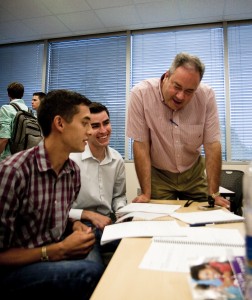He knew he wanted to study business when he arrived at BYU, but he also wanted his future business to aid humanity without sacrificing a profit.
Chris Lewis, a junior from Bourne, Mass., knew he found the crossroads when he learned about the Ballard Center and its social entrepreneurship program from another student.
“The thing that got me into social entrepreneurship was when someone defined it as using business principles to solve social problems,” Lewis said.

Then, on top of that, anyone could participate because everyone had something to offer.
In a promotional video, Dave Peery, executive director of the Peery Foundation and partner of the Ballard Center, explained the need for a variety of students.
“Oftentimes programs in social entrepreneurship are very veered toward business students, and we’re really seeking to engage students from various fields of study,” Peery said.
The Ballard Center began in 2003 as the Marriott Business School recognized the need for a social entrepreneurship program. The push behind it was to involve students in finding solutions to some of the world’s toughest social problems.
In order to reach students, the Ballard Center provides a myriad of involvement options: lecture series, on and off campus internships, various courses, social venture contests and clubs. And with professors piloting new curriculum, it is easy to see how the center is entrepreneurial in and of itself.
Participating in an on-campus internship with the Ballard Center allowed Jessica Biggs, a BYU alumna, the opportunity to beef up her resume because of the well-known organizations she worked with. But even more, the experience enabled her to become more involved with her current community.
The Ballard Center also provides access to an extensive network of partners. Students are given a setup for grasping internship positions and later positions, post-graduation, as a result.
And because each organization has a different emphasis, students from any major can put their knowledge and skills to the test.
In a recent email conversation, Jessamyn Lau, program leader at the Peery Foundation and advisory board member for the Ballard Center, encouraged students to get involved. “We want to prepare students to think about how to put their talent and resources towards the most effective solutions to their community’s problems,” Lau said.
In social entrepreneurship classes, eager students discuss ideas, inspirations and solutions to local and international social problems. Plus, successful innovators frequently visit to share their stories.
“All of us share our expertise. The question is, can we do it more strategically and leverage the skills we have?” Todd Manwaring, managing director of the Ballard Center explained.
According to Manwaring, the only way for the Ballard Center to leverage students’ skills is to increase its number of participants.
Manwaring said that students can create social betterment with the insights they gain from their own areas of study; social entrepreneurship simply opens more windows.
“This is an opportunity,” Manwaring said, “to do good better for the rest of your life.”




